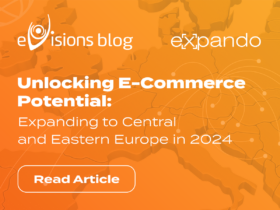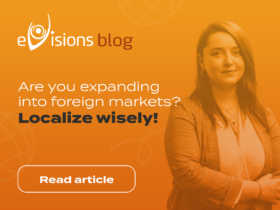Expansion to the DACH region: precision, quality and success
21. 08. 2024 AutorExpanding into the DACH region—encompassing Germany, Austria, and Switzerland—offers a unique opportunity for businesses.
Known for their strong economies, high standards, and robust consumer bases, these countries provide fertile ground for growth. In this article, we delve into the benefits of entering the DACH region and offer essential tips for successfully navigating its distinctive marketplace landscape.

This article has been prepared in cooperation with expando
Why the DACH Region?
The region offers several advantages for online expansion:
- The DACH region is one of the largest and wealthiest markets where consumers are amenable to utilizing e-commerce platforms for the best quality and service.
- Germany’s customers are the leading spenders and purchasers in all of Europe, spending an average of €2,120 for 35 orders per year per customer.
- The region’s unmatched infrastructure offers smooth operations and the overlapping of cultural and linguistic elements allows for simplification of strategies across borders.
- Being located at the heart of Europe, the DACH region is critical to any company’s strategy for establishing a strong presence and achieving sustainable growth in the European market.
Why expand through the marketplace?
- Low entry costs: Compared to setting up your e-commerce store, online marketplaces require minimal upfront investment. You typically only pay fees when you make a sale.
- Reduced infrastructure needs: You don’t need to worry about building your website and managing logistics (if you choose fulfillment by the marketplace),
- Large customer base: Marketplaces have a built-in audience of millions of potential customers who are already actively shopping on the platform.
Considerations To Keep in Mind: Not everything is entirely positive
- Competition: Marketplaces are typically crowded with sellers, so you’ll need to stand out with competitive pricing, high-quality products, and excellent customer service.
- Marketplace fees: While entry costs are low, ongoing marketplace fees can eat into your profit margins.
- Less control: You have less control over branding and customer experience compared to having your own online store.
- Customer support with local language: Marketplaces require you to communicate with customers in the local language of the marketplace. international expansion.

Four marketplaces to choose from

Amazon DE

Amazon DE (amazon.de) is the biggest powerhouse in the e-commerce marketplace in the DACH region. Germany alone is the second largest Amazon market after the United States accounting for 10-15% of global sales. Austria and Switzerland do not have their own Amazon marketplaces and instead choose also to use Amazon DE. Knowing this, expansion to the whole DACH region via Amazon is possible with the addition of only one marketplace.
+ Amazon DE annual sales are approximately €29 billion, this contributes to 10-15% of
Amazon’s global sales making it the second most powerful market after the US. It is
highly established and very popular.
+ Utilizing features of Amazon such as Fulfillment By Amazon (FBA) and Brand Registry
adding Amazon DE to your portfolio is easy and lucrative.
+ Amazon Prime is available in this region for Prime Customers who on average spend 2-3
times more than the average Amazon user.
– The competition on Amazon DE is very tough with a large number of sellers and
competitive pricing.
eBay

eBay can be known as Amazon’s predecessor but the e-commerce platform still boasts an impressive 180 million active buyers and more than 190 markets. Accredited as the first true global marketplace, eBay offers its unmatched brand trust, unique storytelling and the ability to sell just about anything with a catalog of over 1.6 billion products.
+ eBay’s reputation precedes itself with years of tools like buyer protection which has built a strong foundation of brand trust.
+ eBay offers a global shipping program to eliminate the headaches of sorting out customs, duties and other international shipping logistics.
+ eBay is considered to be one of the cheapest options to start selling things online due to its low entry costs and ability to sell subscription fee free.
+ eBay offers the unique option of selling in an auction format.
– eBay does not offer fulfillment services like FBA or FBK which means shipping is entirely dependant on the seller for getting it from the warehouse to the customer
– While eBay is really great for certain types of items like collectables or antiques, they are ill suited for heavy items, perishable goods, or low cost common items.
Kaufland DE/AT

Primarily a brick-and-mortar retailer, Kaufland has launched online marketplaces in Germany (kaufland.de) and Austria (kaufland.at) which rank second to Amazon as the strongest e-commerce markets in the DACH region. Kaufland benefits from the longer establishment in the DACH region which has fostered brand trust and increased the depth of local expertise. One of the fastest-growing online marketplaces in Europe, there is ample opportunity for great success selling through Kaufland.
+ Kaufland offers a similar fulfillment system to Amazon called Fulfillment by Kaufland
(FBK).
+ There is an increased chance of winning a Buybox in addition to more conversions
through faster and more reliable shipping due to lower competition than Amazon.
+ Kaufland has a large geographic reach where a single marketplace can give you access
to a wide range of countries, allowing you to tap into a broader market without needing
individual expansion strategies for each nation.
+ Kaufland also offers localized support in terms of language, currency, and even
marketing tools, making it easier to connect with customers.
– Kaufland is owned by the same corporation (Schwarz Gruppe) as the popular grocery
store chain LIDL. This can sometimes prevent customers from purchasing through theplatform for non-grocery-related items. Users are still adjusting to its new expansive
offerings.
OTTO

OTTO (otto.de) is one of the oldest and most well-established online marketplaces in Germany having been initially founded as a mail-order company in 1949. While primarily an online retailer, their third-party seller feature offers an exclusive way to reach customers through a trusted
platform.
+ OTTO has established a strong presence in Germany and is widely trusted by customers
who value high-quality products and service excellence.
+ Due to the rigorous vetting process for all products sold on OTTO, selling through the
platform automatically grants your brand status as high-quality.
+ OTTO offers a built-in marketing feature called OTTO Market which can be booked as a
managed service through OTTO Advertising.
– The requirements to sell through OTTO are highly specific and all brands that apply are
strictly scrutinized before being granted access to sell through the platform. To even
apply to sell on the marketplace, one must have:
- German corporate legal form
- German VAT ID
- Corporate headquarters address in Germany
- Act as a seller to end customers
- Offer German-speaking customer service
- Dispatch goods from a German warehouse
- After applying to sell through OTTO, the company goes on a case-by-case basis to approve sellers which can be extremely time-consuming.
- Once approved to sell, OTTO uses both a monthly selling fee and an additional commission-based fee. While the latter is about the industry standard, the monthly fee is much higher than the average pricing at €99.90.

Not Expanding Through the Marketplace? What You Should Keep in Mind About the Main Following Areas.
- Market Analysis and SEO: Conduct a thorough market analysis for your product, including competitor analysis and developing an expansion strategy. Don’t forget to optimize for local SEO to reach your target audience effectively.
- Website Localization: Tailor your website for local customers by translating content, using local currencies, and adapting to cultural norms. Continuously update your site to reflect current trends.
- Transparency with GDPR and Policies: Ensure compliance with GDPR, cookies policy, imprint, e-shop rules, delivery, and payment methods. Providing detailed information builds trust, especially as a foreign brand.
- Communicate Uniqueness – USPs: Highlight your unique selling points (USPs) prominently to differentiate from local competitors, like for example sustainability support.
- Legal, Accounting, and Technical Support: Obtain local legal, accounting, and technical support to navigate diverse regulations, such as different VAT rates.
- Local Trust Signals and Certificates: Obtain local trust signals and certificates such as the Trusted Shops seal in Germany, the Händlerbund seal in Austria, or the “Gütesiegel” from the Internet Ombudsstelle in Switzerland to enhance credibility.
- Payment and Delivery Methods: Adjust payment and delivery methods to local preferences, such as Klarna or Sofortüberweisung in Germany, EPS in Austria, or Twint in Switzerland. Be prepared to process payments in different currencies and offer options like cash on delivery, which may be preferred in certain regions.
Take it from our experts
Expanding to sell in the DACH region offers a unique opportunity to reach a huge customer base that already uses e-commerce marketplaces regularly. These three platforms already have established systems and credibility making expansion not only possible but straightforward and rewarding.
This article was created in collaboration with EXPANDO, one of the top five Amazon agencies in Europe.
Are you considering expanding your business to CEE through marketplaces?
or contact Expando on ceo@expan.do.
Special offer for readers: Get started with EXPANDO for free! They’ll waive their fees until your sales hit €3,000.








![Achieving 276% y-o-y Blog Traffic Growth with Topical Authority [Case Study]](https://www.evisions-advertising.com/yPVTOLUdUV/uploads//2024/08/e-blog__EN-1-280x210.png)


Komentáře